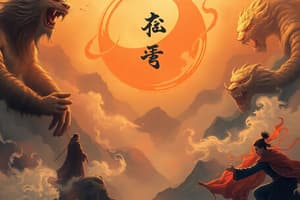Podcast
Questions and Answers
Which of the following best describes the concept of 'Wu-Wei' as it relates to the 'Pooh Way'?
Which of the following best describes the concept of 'Wu-Wei' as it relates to the 'Pooh Way'?
- Intellectual analysis of situations to determine the most efficient course of action.
- Forcefully asserting one's will upon the world to overcome obstacles.
- Effortless action that aligns with the natural flow of the universe. (correct)
- Engaging in constant planning and strategizing to achieve desired outcomes.
How does the 'Baxon' approach contrast with the principles of Taoism as exemplified by Winnie-the-Pooh?
How does the 'Baxon' approach contrast with the principles of Taoism as exemplified by Winnie-the-Pooh?
- Baxons embrace simplicity and contentment, whereas Pooh seeks constant self-improvement.
- Baxons value direct experience, whereas Pooh relies on abstract knowledge.
- Baxons prioritize living in harmony with nature, whereas Pooh focuses on intellectual pursuits.
- Baxons constantly strive and force their will, whereas Pooh follows the natural flow. (correct)
What does the 'Uncarved Block' (Pu) symbolize in Taoist philosophy, as represented by Pooh?
What does the 'Uncarved Block' (Pu) symbolize in Taoist philosophy, as represented by Pooh?
- The inherent value and power found in things in their original, unaltered state. (correct)
- The pursuit of knowledge and intellectual understanding as the path to enlightenment.
- The need to constantly improve oneself through diligent effort and self-discipline.
- The importance of education and refinement in shaping an individual.
How does 'simple-mindedness,' as embodied by Pooh, differ from intellectualism, as represented by Owl?
How does 'simple-mindedness,' as embodied by Pooh, differ from intellectualism, as represented by Owl?
What is meant by 'Inner Nature', or 'Cottleston Pie', and how should one go about understanding it?
What is meant by 'Inner Nature', or 'Cottleston Pie', and how should one go about understanding it?
A person is struggling to assemble furniture from IKEA. Applying the 'Pooh Way', what would be the most appropriate course of action?
A person is struggling to assemble furniture from IKEA. Applying the 'Pooh Way', what would be the most appropriate course of action?
Which of the scenarios is the best example of someone who is stuck 'going somewhere, somewhere'?
Which of the scenarios is the best example of someone who is stuck 'going somewhere, somewhere'?
Compared to people who are constantly learning, how might someone leverage the 'Uncarved Block'?
Compared to people who are constantly learning, how might someone leverage the 'Uncarved Block'?
How does the 'Cottleston Pie principle' relate to the concept of inner nature?
How does the 'Cottleston Pie principle' relate to the concept of inner nature?
What is the primary consequence of not understanding your own inner nature?
What is the primary consequence of not understanding your own inner nature?
How does the concept of the 'Busy Baxon' relate to the idea of appreciating the present moment?
How does the concept of the 'Busy Baxon' relate to the idea of appreciating the present moment?
What does the text imply about the nature of time and the 'Busy Baxon's' approach to it?
What does the text imply about the nature of time and the 'Busy Baxon's' approach to it?
In the context of 'emptiness,' what is the text suggesting when it refers to an 'empty mind'?
In the context of 'emptiness,' what is the text suggesting when it refers to an 'empty mind'?
How does the text contrast 'knowledge' with 'compassion (Zu)'?
How does the text contrast 'knowledge' with 'compassion (Zu)'?
What is the significance of recognizing one's limitations, according to the text?
What is the significance of recognizing one's limitations, according to the text?
How does the story of the Ugly Duckling relate to the concept of inner nature?
How does the story of the Ugly Duckling relate to the concept of inner nature?
What is meant by the 'Tiddly Pom Principle'?
What is meant by the 'Tiddly Pom Principle'?
What does Winnie-the-Pooh symbolize in the context of the characters discussed?
What does Winnie-the-Pooh symbolize in the context of the characters discussed?
What does Rabbit primarily symbolize in the context of the characters?
What does Rabbit primarily symbolize in the context of the characters?
What does Owl primarily symbolize in the context of discussed characters?
What does Owl primarily symbolize in the context of discussed characters?
What does Eeyore primarily symbolize as one of the discussed characters?
What does Eeyore primarily symbolize as one of the discussed characters?
What role does Christopher Robin primarily play among the characters?
What role does Christopher Robin primarily play among the characters?
Which of the following best describes the 'Baxy Backson' mindset?
Which of the following best describes the 'Baxy Backson' mindset?
In the context of Taoism and 'The Dao of Pooh,' what does 'nothing' primarily represent?
In the context of Taoism and 'The Dao of Pooh,' what does 'nothing' primarily represent?
How does 'The Dao of Pooh' generally portray the role of scholars and the accumulation of knowledge?
How does 'The Dao of Pooh' generally portray the role of scholars and the accumulation of knowledge?
What is the core principle behind 'The Pooh Way' (Wu Wei)?
What is the core principle behind 'The Pooh Way' (Wu Wei)?
What does the concept of the 'uncarved block' represent in 'The Dao of Pooh'?
What does the concept of the 'uncarved block' represent in 'The Dao of Pooh'?
How does the 'Tiddly Pom' principle illustrate the impact of our actions and attitudes?
How does the 'Tiddly Pom' principle illustrate the impact of our actions and attitudes?
Which Winnie the Pooh character embodies the principle of limitless energy but lacks understanding of their limitations?
Which Winnie the Pooh character embodies the principle of limitless energy but lacks understanding of their limitations?
What is the central message conveyed by the excerpts regarding the pursuit of a fulfilling life?
What is the central message conveyed by the excerpts regarding the pursuit of a fulfilling life?
According to the excerpts, what are the potential pitfalls of the 'busy Backson' mindset?
According to the excerpts, what are the potential pitfalls of the 'busy Backson' mindset?
How do the excerpts suggest one can find happiness and wisdom?
How do the excerpts suggest one can find happiness and wisdom?
What is the main purpose of 'The Dao of Pooh' in relation to Taoism?
What is the main purpose of 'The Dao of Pooh' in relation to Taoism?
What does the 'Cottleston Pie Principle' encourage individuals to do?
What does the 'Cottleston Pie Principle' encourage individuals to do?
How can scholars and knowledge become counterproductive, according to the book?
How can scholars and knowledge become counterproductive, according to the book?
What does 'The Pooh Way' involve in achieving one's goals?
What does 'The Pooh Way' involve in achieving one's goals?
Flashcards
The Dao/The Way
The Dao/The Way
The natural, effortless way of the universe. Aligning with it brings understanding.
The 'Pooh Way' (Wu-Wei)
The 'Pooh Way' (Wu-Wei)
Acting without forced effort. Following the flow and letting things unfold naturally.
Baxon Approach
Baxon Approach
Those always striving and pushing, trying to force their will, leading to frustration.
The Uncarved Block (Pu)
The Uncarved Block (Pu)
Signup and view all the flashcards
Simple-Mindedness
Simple-Mindedness
Signup and view all the flashcards
Inner Nature
Inner Nature
Signup and view all the flashcards
Embracing Simplicity
Embracing Simplicity
Signup and view all the flashcards
Forcing things
Forcing things
Signup and view all the flashcards
Cottleston Pie Principle
Cottleston Pie Principle
Signup and view all the flashcards
Self-Reliance
Self-Reliance
Signup and view all the flashcards
The "Busy Baxon"
The "Busy Baxon"
Signup and view all the flashcards
Value of "Nothing" (Emptiness)
Value of "Nothing" (Emptiness)
Signup and view all the flashcards
Importance of the Present Moment
Importance of the Present Moment
Signup and view all the flashcards
Compassion (Zu)
Compassion (Zu)
Signup and view all the flashcards
Acknowledging Limitations
Acknowledging Limitations
Signup and view all the flashcards
Tiddly Pom Principle
Tiddly Pom Principle
Signup and view all the flashcards
Symbolism of Winnie-the-Pooh
Symbolism of Winnie-the-Pooh
Signup and view all the flashcards
Symbolism of Rabbit
Symbolism of Rabbit
Signup and view all the flashcards
Symbolism of owl
Symbolism of owl
Signup and view all the flashcards
Symbolism of Eeyore
Symbolism of Eeyore
Signup and view all the flashcards
Symbolism of Piglet
Symbolism of Piglet
Signup and view all the flashcards
Symbolism of Christopher Robin
Symbolism of Christopher Robin
Signup and view all the flashcards
The Ugly Duckling Metaphor
The Ugly Duckling Metaphor
Signup and view all the flashcards
Tigger's Symbolism
Tigger's Symbolism
Signup and view all the flashcards
The 'Pooh Way' Philosophy
The 'Pooh Way' Philosophy
Signup and view all the flashcards
What is a 'Baxy Backson'?
What is a 'Baxy Backson'?
Signup and view all the flashcards
Significance of 'Nothing'
Significance of 'Nothing'
Signup and view all the flashcards
The Role of Scholars (Owl)
The Role of Scholars (Owl)
Signup and view all the flashcards
Effortless Action (Wu Wei)
Effortless Action (Wu Wei)
Signup and view all the flashcards
The Uncarved Block
The Uncarved Block
Signup and view all the flashcards
Accepting Limitations
Accepting Limitations
Signup and view all the flashcards
The Dao of Pooh
The Dao of Pooh
Signup and view all the flashcards
Living In Accordance
Living In Accordance
Signup and view all the flashcards
Using your strengths
Using your strengths
Signup and view all the flashcards
State of Nothing
State of Nothing
Signup and view all the flashcards
Wisdom
Wisdom
Signup and view all the flashcards
Study Notes
- The audio excerpts explore Taoism through Winnie-the-Pooh, contrasting Pooh's wisdom with the complexities of "Baxons" and impractical "scholars."
- True fulfillment comes from living in harmony with one's inner nature and the natural order.
The Dao/The Way (and the "Pooh Way")
- The Dao is the natural, effortless way of the universe, best understood through alignment rather than force.
- The "Pooh Way" (Wu-Wei) means "without doing," following the flow of things naturally, like water around rocks.
- Wu-Wei: "without meddlesome, assertive, or egotistical effort."
- Baxons strive and force their will, leading to frustration; they are always "going somewhere," but actually going nowhere.
- The Baxons are always trying to get somewhere, but they never actually arrive anywhere new
The Uncarved Block (Pu)
- Represents things in their original, natural state, embodying simplicity, plainness, and honesty; Pooh embodies this.
- The essence of the uncarved block is that things in their original simplicity contain their own natural power that can easily be spoiled.
- Simple-Mindedness is an uncluttered mind, perceiving things directly without intellect or ego distortions.
- Scholars like Owl overcomplicate matters, missing simple truths evident to someone like Pooh.
Inner Nature (Cottleston Pie)
- The unique qualities and tendencies of every individual, best understood through direct experience.
- The Cottleston Pie principle means things should be as they are and used according to their nature.
- Inner nature is what makes someone truly different and unique in fact.
- Self-Reliance comes from understanding and working with your own inner nature, rather than being influenced by others.
- Understanding yourself allows you to know where you belong; being in the wrong situation causes trouble.
- When you know and respect your own inner nature, you know where you belong and where you don't.
The Problem with the "Busy Baxon"
- Restlessness is a constant need to be active, driven by an external search for a "great reward."
- The busy Baxon always searches for reward, working hard to catch it.
- Baxons view physical activity as work, not as a source of joy.
- "Saving Time" is a misplaced obsession that leads to wasting it; time can only be spent, not saved, and is best spent wisely by appreciating the present.
- The pissy Baxon has practically no time at all because he's too busy wasting it by trying to save it.
- Baxon society worships youth but destroys it, for example, through fast food.
- Baxons struggle to appreciate natural beauty and rhythms.
The Value of "Nothing" (Emptiness)
- Not a void, but a space for clarity and awareness, free from clutter and overthinking.
- An empty sort of mind is valuable for finding pearls and tails and things because it can see what's in front of it.
- The ability to see things as they are, without preconceptions or intellect.
- Overstuffed minds miss important things.
- Acknowledging emptiness can lead to a deeper sense of fullness.
Importance of the Present Moment (Awareness)
- Happiness is in the process of life, not the distant goal; enjoy the journey.
- Awareness is being present in the moment, experiencing life directly.
- We would call it awareness. It's when we become happy and realize it, if only for an instant.
- Appreciation involves taking the time to appreciate your surroundings and your life; when you do, you have no time to be a busy Baxon.
Compassion (Zu)
- The essence of Zu is caring and compassion and comes from the heart.
- From caring comes courage.
- Compassion leads to wisdom and courage.
- Knowledge doesn't care, but wisdom does.
Limitations and Strengths
- Recognizing one's limits is essential to developing strengths; limitations can be advantages if acknowledged.
- Once you face and understand your limitations, you can work with them instead of having them work against you and get in your way.
- Weaknesses can be channeled in a positive direction.
- The ugly duckling is a metaphor for recognizing one's unique potential and inner nature.
- For within the ugly duckling is the swan.
Tiddly Pom Principle
- Actions/tendencies create a snowball effect, positive or negative.
- Working with the tiddly palm principle, you use respect to build respect
- Make it work for yourself and for the benefit of others or face the ugly consequences.
Characters and Their Symbolism
- Winnie-the-Pooh embodies naturalness, simplicity, and wu-wei; a natural Dowist who succeeds by following his nature.
- Rabbit represents the overly clever and controlling mind.
- Owl symbolizes the impractical intellectual scholar.
- Eeyore represents the complaining, pessimistic mindset.
- Piglet symbolizes bravery, love, and self-sacrifice.
- Christopher Robin acts as a guide, having meaningful conversations.
- Tigger symbolizes limitless energy without understanding limitations, but possesses helpful qualities.
In Summary
- The excerpts advocate for a harmonious life by adopting simplicity, awareness, and effortless action.
- They warn against the "busy Baxon" mindset, which is focused on external goals and neglects the present.
- Happiness and wisdom are found by aligning with the natural order and embracing inner nature like Pooh.
FAQ: The Dao of Pooh and the Way of the Uncarved Block
- "The Dao of Pooh" applies Taoist principles through Winnie the Pooh, illustrating the way things naturally are.
- A Baxy Backson is someone overly busy, seeking external validation, the opposite of the Taoist ideal, and disconnected from the present.
- The Cottleston Pie principle accepts things as they are, emphasizing inner nature and using strengths.
- "Nothing" in Taoism is openness and pure potential, allowing wisdom to arise naturally.
- Scholars/knowledge (like Owl) are presented as overly intellectual, detached, and counterproductive.
- "The Pooh Way" (wu wei) is action based on non-action, acting in accordance with the natural flow of things.
- The "uncarved block" represents the original, unspoiled state, embodied by Pooh's simple-mindedness.
- The "Tiddly Pom" principle illustrates the snowball effect of actions, emphasizing positive intentions.
Studying That Suits You
Use AI to generate personalized quizzes and flashcards to suit your learning preferences.




